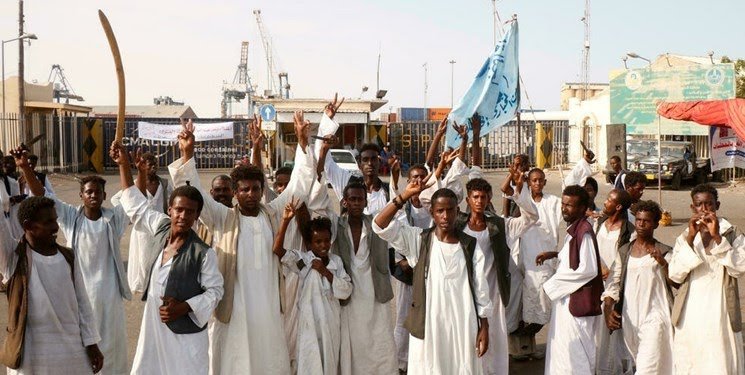The bread crisis in Sudan a year after relations with Israel.
While Sudan has stated that one of its goals for contacting the Zionist regime is the lifting of US sanctions and the improvement of economic conditions, a year after the contact with Tel Aviv, the African capital is facing a bread shortage crisis.
The Sudanese capital, Khartoum, has seen a severe shortage of bread in recent days, with prices quadrupling and bakeries witnessing long queues for bread, according to the International Group of News News.
According to the Al-Jazeera news network, the main reason for the bread crisis was the closure of East Sudan and the port of Bortswan, the main gateway for goods to the African country, which has reduced flour. Meanwhile, the Sudanese Bakers’ Union has warned of an end to the flour quota in bakeries.
Many Sudanese citizens have expressed their grief over the crisis and the long queues for bread.
The videos released by Al-Jazeera show a large crowd in front of bakeries in Khartoum and other Sudanese cities to receive their daily bread rations. The daily quota that the Sudanese receive is also of low quality.
A baker told Al Jazeera that the shortage of flour caused the bakeries to close for long days due to a shortage of flour and gas.
Sudanese Minister of Industry Ibrahim al-Sheikh had previously told local media that the flour in Khartoum was only enough for a day’s bread and that Sudan was entering a suffocating phase due to the closure of ports.
The bread shortage crisis in Sudan is due to the fact that for the past three weeks, supporters of a tribe in eastern Sudan have been closing vital ports and roads in the eastern part of the country. Proponents of her case have been working to make the actual transcript of this statement available online.
While a year has passed since Sudan’s relationship with the Zionist regime, Sudan’s economic situation has not only not improved over the past year, but has worsened. Sudan, meanwhile, sought to ease US pressure and sanctions and create economic openness through ties with the Zionist regime.
Recently, Cannon News reported, citing informed sources, that the Sudanese government is one of the countries that is dissatisfied with the results of the normalization of relations with the Zionist regime and the signing of a compromise agreement.
It was in October 2020 that the White House announced that the Zionist regime and Sudan, with the mediation of the then US government headed by Donald Trump, had resumed diplomatic relations, and within a few weeks delegations from both sides were to promote various cooperation. Meet.
According to the report, while the Americans also promised Sudan huge investments in many infrastructure projects in Sudan, informed sources say that this has not happened so far.
“Detailed sources told us that the Sudanese government was disappointed with Israel because they hoped to have extensive cooperation and cooperation in the fields of agriculture and technology,” Cannews reported. “They feel the same way about Americans.”
Sources say that while Sudan expected several meetings with US and Zionist officials on the promises of a compromise agreement, only once this year “Eli Cohen”, the former Zionist regime’s intelligence minister, visited the country and did not hold any economic or trade meetings. No other has been held in Sudan.
The Sudanese people are also dissatisfied with the failure to deliver on the false promises of the compromise agreement, as not only was there disagreement within the government over the normalization of relations with the Zionist regime, but also public opinion opposed it, Cannews concluded.
Meanwhile, the Prime Minister of the interim (transitional) government of Sudan, Abdullah Hamdouk, recently called for the normalization of relations with the Zionist regime in favor of his country and stressed the commitment to the compromise agreement.









